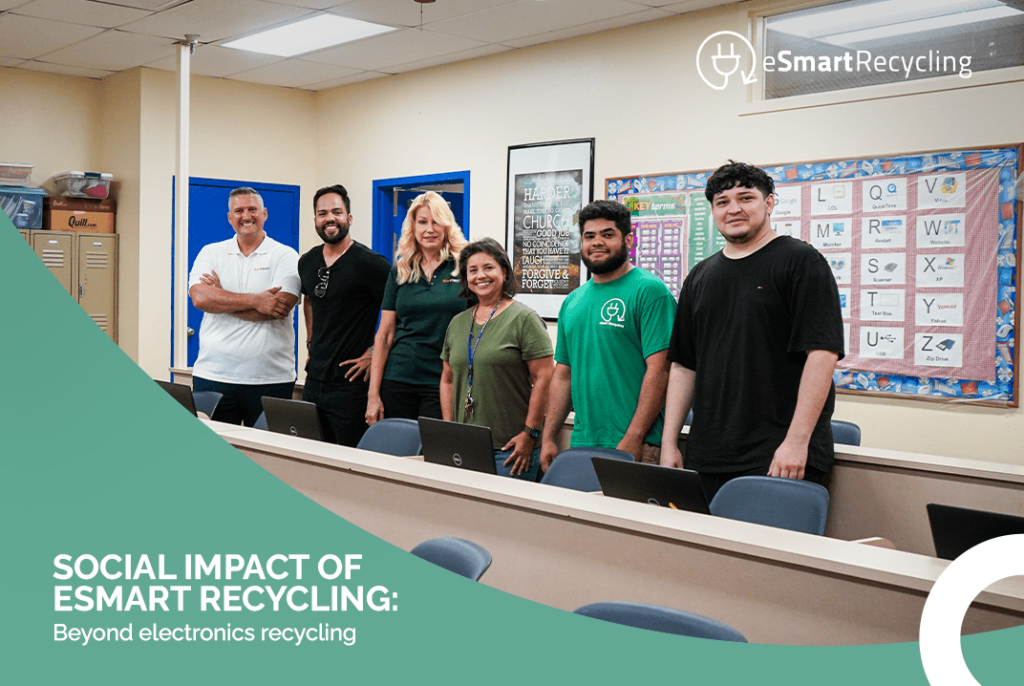
At eSmart Recycling, we believe our commitment to environmental sustainability goes beyond simply recycling electronics. Our mission is to make a positive social impact in communities across the globe through our innovative recycling practices. In this article, we will explore the various ways in which eSmart Recycling contributes to the social well-being of individuals and society as a whole.
eSmart Recycling plays a vital role in job creation and economic growth in the regions where we operate. By developing partnerships with local governments and organizations, we establish recycling centers that not only provide a safe and responsible disposal solution for electronic waste but also serve as employment hubs.
Through these partnerships, we are able to hire and train local individuals, equipping them with valuable skills in recycling and waste management. This not only helps reduce unemployment rates but also stimulates economic growth as these newly employed individuals contribute to local businesses and the overall economy.
In today’s digital age, access to technology is crucial for individuals to fully participate in society. Unfortunately, many communities, especially in developing countries, lack access to computers and other electronic devices. This digital divide prevents them from benefiting from educational resources, online job opportunities, and communication platforms.
eSmart Recycling bridges the digital divide by refurbishing and repurposing donated, used electronics. We collaborate with educational institutions, non-profit organizations, and low-income communities to provide them with affordable, high-quality, refurbished devices. By doing so, we empower individuals and enable them to access the digital world, ultimately fostering social inclusion and economic empowerment.
As an advocate for environmental sustainability, eSmart Recycling recognizes the importance of education and awareness in driving positive change. We offer educational programs and workshops to schools, businesses, and community groups to raise awareness about the importance of responsible e-waste disposal and recycling.
Through these initiatives, we aim to educate individuals about the environmental impact of electronic waste, encourage them to adopt sustainable practices and empower them with the knowledge needed to make informed decisions regarding electronic devices. By promoting a culture of responsible consumption and recycling, we contribute to the overall well-being of the environment and future generations.
In order to create a lasting social impact, eSmart Recycling actively engages with local communities and encourages their involvement. We organize community clean-up events, electronic waste collection drives, and other initiatives to actively involve residents in our recycling efforts.
By involving the community, we empower individuals to take ownership of their environment and contribute to its sustainability. We provide them with the necessary resources and guidance to actively participate in recycling programs, making them an integral part of the solution rather than just bystanders.
eSmart Recycling’s social impact extends far beyond electronics recycling. Through job creation, bridging the digital divide, environmental education, and community engagement, we strive to make a positive difference in the lives of individuals and society as a whole. By embracing our mission and values, we can build a future where environmental sustainability and social well-being go hand in hand.
Recycling is essential for businesses as it helps reduce their carbon footprint and minimize environmental damage. To have reliable recycling practices, it is important to understand the importance of recycling and how to ensure that your company recycles correctly. This article will explore the importance of recycling and provide some tips for ensuring that your company recycles effectively.
Recycling offers several advantages for businesses and the environment. Recycling companies can save money on waste disposal, as many recycling centers charge less for recycled materials than general waste. Recycling helps companies to meet their sustainability goals, reduce energy consumption, and decrease carbon footprint. Moreover, recycling can help reduce the amount of non-recyclable waste in landfills, contributing to pollution and climate change.
Now that you know the benefits of recycling, it’s time to learn how to implement reliable recycling practices in your company. This means having processes that ensure materials are sorted, stored, and transported correctly.
The first step to implementing reliable recycling practices is to assess your current waste management and recycling practices. This will help you understand the materials generated, the amount of recyclable and non-recyclable materials, the density of the items, and how they are currently collected and processed. With this information, you can better determine what changes must be made to your recycling programs.
An excellent way to ensure reliable recycling is to incentivize employees to recycle. This could be a rewards program, such as a point system for recycling certain items or recognition programs for outstanding recycling practices. Making recycling fun and rewarding can encourage staff participation.
Another way to ensure reliable recycling is to provide clear recycling instructions. Ensure all employees know which materials are recyclable, where to dispose of them, and what type of containers to use. Facilitating this information can help ensure that everyone recycles correctly. Additionally, ensure all your employees are familiar with your waste management and recycling practices and are interested, involved, and dedicated to participating in your recycling program.
Finding the right recycling partner is important for reliable recycling practices. Research potential recycling companies to determine which fits your company’s goals and needs best. This will ensure your materials are collected, processed, and transported properly. Additionally, working with the right recycling company can help you reduce the cost of recycling, as many companies offer volume discounts or discounts for participating in recycling programs.
Recycling is an essential practice for businesses that want to reduce their impact on the environment. For reliable recycling, it is important to understand the benefits of recycling, assess your current waste management and recycling practices, offer incentives for employees to recycle, provide clear instructions on proper recycling, and find the right recycling partner. By following these steps, businesses can ensure that their recycling practices are reliable and that they are doing their part for the environment.
Computers have become an essential part of modern businesses. Computers seem everywhere, from simple tasks like creating a to-do list to complex responsibilities like preparing annual reports. Although recycling computers may seem straightforward, there’s much more to it than meets the eye.
As a CEO, you must familiarize yourself with computer recycling. Not only is it increasingly important as the climate crisis looms, but it can also significantly impact your company’s bottom line.
This comprehensive guide will teach you everything you need to make informed decisions about computer recycling. From understanding the general process to making the best decisions for your business, you’ll have all the information you need to ensure your business’s success.
Electronic device recycling is exactly what it sounds like: recycling old computers. But here’s where things get complicated. Recycling involves many processes, from reusing components and parts to destroying devices. The goal is to reduce waste and maximize the value of the devices.
But recycling is much more than just disposing of old computers in a more environmentally friendly way. A complete recycling process involves determining the best use of the device and its components (such as reselling or reusing them), properly erasing all personal data, and ensuring all regulatory requirements are met.
There are many reasons why your company should care about recycling computers. One of the main ones is that it’s the right thing to do. Recycling old computers can help minimize the environmental impact and reduce your company’s carbon footprint.
However, computer recycling can also have significant economic implications. If your company recycles its old devices properly and effectively, it could benefit from potential revenue. Companies can earn money by selling or leasing used devices while promoting sustainability.
Electronic device recycling can also help protect your company from security threats. Too often, old devices are thrown away, which can be a big problem if they contain sensitive data, such as customer information. Properly recycling devices can ensure that all sensitive information is completely erased.
There is no one-size-fits-all answer to this question, as electronic device recycling can involve many processes. These can range from recycling as is, dismantling devices, selling parts separately, or physically destroying electronic devices. It all depends on the devices in question, the individual needs of the company, and regulatory requirements.
If a company wants to make the most of its devices, opting for a more complex recycling process is usually best. This involves evaluating the devices, ensuring they are certified as safe, properly erasing all data, and determining the best use for the device and its components. It can be cumbersome but usually worth it in the long run.
As a CEO, it’s important to familiarize yourself with recycling electronic devices. From understanding what it is to why it’s crucial for your company, the different types of processes, and what’s needed to participate.
If you want to start recycling electronic devices, research reputable companies and find one that best suits your company’s needs. Don’t be afraid to ask questions: the right partner can help you make the most of your old devices.
You can choose the best way to recycle or dispose of your old devices with the correct information. From boosting environmental sustainability to protecting your company from security threats, electronic device recycling can significantly benefit your business. Take the first steps today to ensure your company is well-prepared for success.
Now that you understand better what electronic device recycling entails, are you ready to incorporate it into your company’s practices? With the help of a trusted partner and the right educational resources, you can be on the right track to take advantage of proper electronic device recycling.
Electronic waste (e-waste) is a serious issue in Florida. Businesses generate significant electronic waste, contributing to pollution and health risks if not properly managed. Since Florida ranks third in electronic waste production and the volume grows yearly, managing electronic waste for Florida businesses has become a critical issue in the Sunshine State. This article aims to guide best practices in electronic waste management. It provides practical tips to help Florida businesses comply with regulations, reduce electronic waste, recover value, and minimize environmental impact.
Electronic waste is any electronic device that is no longer useful to its original owner. Common examples of electronic waste include old computers, printers, mobile phones, scanners, and other electrical or electronic appliances. Electronic waste can range from laptops to appliances that are no longer used or are obsolete. Electronic waste is a growing problem, and it is estimated that businesses in Florida will recycle over 500 million kilograms of electronic waste in the next five years.
Recycling electronic waste has several advantages. The most notable is that it helps reduce pollution and health risks associated with improper disposal. Additionally, recycling electronic waste can recover valuable resources and reduce the energy needed to manufacture new products. By recycling electronic waste, Florida businesses can protect natural resources, reduce their carbon footprint, and generate additional income or save costs in the long term.
Florida businesses must follow best practices in electronic waste management to reduce their environmental impact and comply with local, state, and federal regulations. Here are some recommended guidelines and tips to help businesses optimize their electronic waste management practices:
The first step in electronic waste management is to thoroughly audit the electronic items currently in use or to be discarded. This audit will help businesses identify and classify the types of electronic waste, determine the most appropriate disposal options, and track their electronic waste management practices over time.
Businesses should choose the most environmentally friendly option when disposing of electronic waste. This typically involves recycling as much of the electronic waste as possible and safely disposing of any hazardous material. Electronic devices that still work can be donated to charities, and those that do not work can be taken to a certified electronic waste recycling company.
As electronic waste becomes an increasingly major issue worldwide, educating employees and establishing a policy that outlines a responsible and sustainable approach to electronic waste management for Florida businesses is important. Employees should be encouraged to reuse and recycle whenever possible, and all electronic waste should be tracked and properly reported. Businesses should also partner with certified recycling companies and strive to reduce the generation of electronic waste whenever possible.
Partnering with a certified and reliable electronic waste recycling company is another great way to ensure that Florida businesses properly manage their electronic waste. This typically involves a recycling company coming to the business to collect and properly dispose of all electronic waste. Additionally, certified recycling companies often provide a certificate of destruction or recycling so businesses can be sure they comply with all state and federal regulations.
Florida businesses can also take additional steps to help reduce their generation of electronic waste. This can include purchasing electronic devices with a longer lifespan, recycling and reusing components whenever possible, and participating in product take-back programs when purchasing new items. Additionally, educating employees about the importance of responsible electronic waste management and adopting energy-efficient practices can help significantly reduce the production of electronic waste.
Managing electronic waste in Florida is an essential issue for all businesses in the state. Proper electronic waste management can help businesses reduce their environmental impact, improve regulatory compliance, and generate additional income or save costs in the long term. By following the best practices in electronic waste management outlined in this article and taking additional steps to reduce the generation of electronic waste, Florida businesses can play a significant role in reducing the growing problem of electronic waste.
Recycling electronic devices is a crucial step in conserving resources and the well-being of our planet. Electronic waste has become a serious global issue. Millions of tons of electronic waste are generated yearly, which can harm the environment if not properly managed.
Recent studies and life cycle assessments (LCA) have shown that recycling electronic devices is a more sustainable approach for the environment and can even yield economic benefits. This article will explain why recycling electronic devices is more eco-friendly than disposing of them, along with other important considerations.
It’s commonly known that recycling boosts sustainability efforts by reducing waste and conserving resources. In a traditional LCA of electronic devices, the environmental costs of extracting raw materials, manufacturing, distribution, use, maintenance, and end-of-life treatment are considered. An LCA also examines the recycling process of electronic waste, from collection to treatment, and analyzes the environmental impact of this process.
One of the main advantages of electronic recycling is that it reduces the amount of electronic waste sent to landfills. Various materials, including precious metals like gold and silver, can be recovered and reused when collected and processed correctly. This helps conserve resources and also prevents hazardous substances from contaminating landfills.
Additionally, there are potential economic benefits associated with electronic recycling. Many electronic devices contain precious metals and other valuable materials that can be recovered and reused. As a result, businesses and organizations that recycle electronic waste can enjoy cost savings by obtaining these materials for free or at a fraction of the cost compared to purchasing new ones.
Despite electronic recycling’s benefits, some important considerations are still worth exploring. One of the biggest challenges associated with electronic recycling is the logistics of collecting, processing, and distributing materials. Properly recycling electronic waste requires a robust collection, transportation, and treatment facility network and appropriate recycling strategies.
Another important consideration is the environmental impact of electronic recycling. LCA studies show that recycling electronic devices is more eco-friendly than disposing of them in landfills or incinerating them. However, the electronic recycling process itself also has its environmental impact. From the energy required for collection, transportation, and treatment to the pollution caused by the recycling process, electronic recycling is not free of environmental costs.
Despite the challenges and environmental impacts associated with electronic recycling, studies show that it remains a more eco-friendly option for the environment compared to other waste treatment options. Electronic recycling can reduce the amount of electronic waste in landfills while conserving valuable resources. Additionally, businesses and organizations can enjoy potential economic benefits from electronic recycling.
Therefore, we must make a collective effort to recycle our electronic devices properly. As an individual, you can take steps to ensure that your electronic devices are recycled professionally. You can look for recycling centers in your area that accept electronic waste and understand the collection, transportation, and recycling processes to ensure that materials are recycled effectively and responsibly. By doing your part to recycle electronic devices properly, you can help reduce the environmental impact of electronic waste and promote a greener future.
Are you planning to recycle your old electronic devices? Technology advances yearly, and companies continuously purchase new devices to stay ahead of the competition. Many of these devices contain sensitive information, and if not disposed of securely before recycling, they can put you at significant risk. You wouldn’t want your company to fall victim to identity theft and financial fraud. That’s why it’s essential to dispose of information securely before recycling. In this article, we’ll outline the steps every company should follow to protect themselves and their customers.
First, you’ll want to assess the state of your data. Check your devices and determine if information needs to be securely erased. Analyze your hard drives and overall data storage to understand the complexity involved. This will help you lay the groundwork for a comprehensive plan. If you need to become more familiar with data security or need more internal resources, consider hiring a data security analyst.
After assessing the state of your data, compile an inventory of your assets. In addition to listing your devices, detail all the data stored within them to ensure nothing is overlooked. It’s common for companies to need to remember to back up data, leading to information leaks. Identify all potential vulnerabilities in your system and address them immediately. This will help you maintain an organized inventory.
Back up all relevant data for the future. This includes presentations, marketing materials, customer information, company data, and financial records. An excellent way to do this is to store everything on a cloud service like Dropbox or Google Drive. It’s easy and quick. Another option is to store this information on an external hard drive for added security. Make this an essential part of your data disposal plan. You would want to keep all important information in the recycling process.
An important step in the process is to create a data deletion plan. Determine which devices must be destroyed and which documents must be shredded. It’s best to list devices that need to be securely disposed of. Next, create a detailed chart with all the steps you’ll need to follow to ensure the task is done accurately and efficiently. Also, set a timeline and a budget to adhere to. Discuss this plan with your IT and legal departments for any potential input.
At eSmart Recycling, we specialize in secure data destruction, using various state-of-the-art tools and techniques to ensure compliance with all relevant regulations. Additionally, we provide our clients with a destruction certificate to offer further security and peace of mind. With eSmart Recycling, you can trust that your data will be handled professionally and carefully.
Recycling old electronic devices can be a great way to help the environment, but it comes with some serious risks that you need to be aware of. Companies must follow a comprehensive data deletion plan to avoid becoming victims of financial fraud and identity theft. Start by assessing the state of your data, creating an inventory of your assets, and backing up all relevant information.
Develop a data deletion plan and hire a professional data destruction company. Ensure your deletion plan complies with regulations and consider the process. Taking the right steps ensures the security of your company and your customers.
As technology develops at a breakneck pace, electronic waste, or e-waste, is becoming an increasingly significant problem. The growing reliance on digital devices has resulted in many electronic waste from businesses ending up in landfills. However, more and more companies are realizing the importance of proper electronic waste management. It’s essential to demonstrate corporate responsibility and make a real difference. Please read to learn how your company can implement its ethical electronic waste management program.
Electronic waste is a term used to describe any unwanted electronic device, such as computers, laptops, tablets, smartphones, and audio equipment. All these devices contain toxic materials that can leach into the soil and water if not disposed of properly. Ethical management of electronic waste involves identifying your company’s electronic waste, recycling reusable materials, and safely disposing of the rest to protect the environment.
Corporate responsibility is the ethical standard that every company should strive for. It’s about making responsible decisions and taking actions that benefit people and the planet beyond profit-making. Managing electronic waste is a crucial component in this regard. The electronic waste produced by your company can have a substantial human and environmental impact. Without proper disposal, toxic materials and heavy metals can leach into the environment and if decomposed, can release greenhouse gases into the atmosphere. All companies should aspire to operate ethically and responsibly and consider implementing electronic waste management practices.
The first thing your company can do is identify its electronic waste and consider ways to reduce it. This could involve finding more efficient and less wasteful computing solutions, recycling old equipment, or improving the lifespan of devices. After this, your company can choose a trusted electronic waste management program to send its electronic devices when they end their useful life. Several national and local programs can be used in this regard.
Your company should also try to offset its environmental impact. Taking steps to ensure that electronic materials are used responsibly and disposed of ethically is one measure that can be adopted. Measures to improve energy use and reduce CO2 emissions will also positively impact. Another good practice is encouraging employees to bring their electronic waste from home to be recycled at the company.
Many large companies have taken identifiable steps to manage their electronic waste. A great example is Apple’s recycling and reuse programs. All new Apple products come with a prepaid recycling label, and the company has an iPhone refurbishment program where old devices are dismantled and reusable components are extracted. Microsoft and HP are two major brands that are increasingly concerned with electronic waste management. Both companies have programs to ensure responsible dismantling, recycling, and reuse.
Electronic waste is an ever-growing problem, and if not managed properly, the impact on the environment and human health can be severe. Taking steps to dispose of electronic waste properly is an important part of corporate responsibility. Your company should identify its electronic waste and consider ways to reduce it. Then, it should choose a trusted electronic waste management program and have means to dispose of its electronic waste. Companies should strive to offset their environmental impact by avoiding electronic waste, using materials responsibly, and reducing energy consumption.
Remember, responsible corporate behavior is increasingly important. Make a positive contribution and enroll your company in an ethical electronic waste management program today.







If you want to know more about the different programs, partners, and overall cool things happening in the eSmart world, share your email with us, and Join the E-Revolution.


